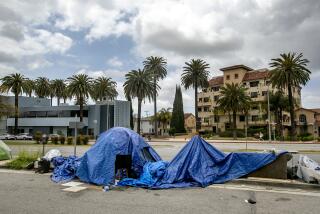No Home, Bad Rep, Big Heart
- Share via
SAN FRANCISCO — For 16 years, Dane Johnsten has been a pain-in-the-neck panhandler in this city’s Castro district.
On some days, the gangly 39-year-old in the filthy Army fatigues and torn motorcycle jacket can make people smile with his reality-of-the-streets comedy rap.
“Having a bad day?” he asks. “Well, I’m having a worse one.”
But his mood can change, almost between breaths.
“One misplaced word will trigger him,” said Ray Powers, owner of the Welcome Home restaurant. “He’ll go bananas and haunt you for a week. He’ll walk by and stare at you.”
Johnsten has been booted from churches for being too loud. He’s unloaded on people for taking up too much sidewalk, tying up the pay phone or suggesting there might be medications for his brand of in-your-face anger.
“He once had three restraining orders for abusing neighbors and businesses,” Police Officer Lisa Frazer said. “One by one, the people moved away for one reason or another. But Dane stayed. He outlived them all.”
These days, Johnsten’s life is less defined by such standoffs. More people give him the benefit of the doubt.
Because last month he did something no one expected. In 15 fast-moving minutes, Johnsten went from pariah to hero.
*
Johnsten arrived in the Castro in 1990, a 23-year-old drifter on the run from his rural roots.
He grew up in Ravenna, Neb. (pop. 1,000). He hated small-town life. There were fights with his “terminally square” parents. He stole things and grew his hair into dreadlocks. In high school, he said, he was voted “most likely to be murdered.”
Still, he tried to fit in: He served in the Army, worked as a vat cleaner in a cheese factory. He bought a house.
But Johnsten was also bisexual in a place where few admitted such things. “In Nebraska, you’re not gay, you’re just drunk,” he scoffed.
One day, over a seemingly innocuous incident -- a motorcycle repair more expensive than he’d planned -- Johnsten abandoned his house, truck and job. He hit the road.
“I wanted to be a rock star,” he said. “Maybe I should’ve learned to play an instrument and joined a band.”
Instead, he landed in Eugene, Ore., where he frequented shelters and earned money selling sex in a park.
Then he moved to San Francisco’s Castro, where plenty of men were willing to pay for sex. One customer rented an apartment for Johnsten. When that relationship soured, he returned to the streets.
“I had this thing about my trick,” he said. “I didn’t want him to touch me.”
Social workers urged Johnsten to clean himself up. He not only stubbornly stayed on the streets, he stopped washing his hands to thumb his nose at the “do-gooders.”
“I didn’t want to rejoin society,” he said. “This country is always going off to fight unjust wars, and I’m the one who’s loony because I talk to myself and won’t wash my hands.”
*
With his disheveled hair, scraggly beard and piercing opal eyes, Johnsten cuts an intimidating figure. He’s anything but predictable.
One night, he walked into a community center’s open-mike comedy night. “People gasped,” said Frazer, the officer who patrols the Castro. “They knew how outrageous Dane could be. But he took the mike for three minutes of comedy that were really funny.”
Days later, Johnsten was his hair-trigger self when Frazer asked why he wouldn’t accept help to leave the streets.
“He told how one Midwestern town caught all the stray dogs and killed them,” she said. “Then he ran down the street, yelling, ‘Please don’t kill me!’ People stared at me. Dane creates that kind of drama.”
He once exploded at a store owner for implying he was a thief. “I called her fat,” he said. “She cried and people blamed me. I wanted to tell them, ‘Hey, I’m crying inside too.’ ”
Isaiah Carter, a manager at the Body clothing store on Castro Street, had run-ins with Johnsten, but Carter said he came to realize that Johnsten’s bad behavior was a way of acting out in self-defense.
“Dane isn’t one of those psychotics whose mind is already gone, whose spirit has left the building,” Carter said. “He’s still here among us.”
Along with the outbursts, Johnsten reveals another side. He reads newspapers he scrounges from trash bins and talks knowledgeably about politics and foreign affairs.
Johnsten has broken up fights between other street denizens. He once found a credit card outside an automated teller machine and turned the card in to the bank. He stepped in to stop a mugger from robbing a store owner he had befriended.
Johnsten said he no longer steals, for one reason: It’s what people expect. “No one believes in you. You’re a thief because you’re homeless. You go the extra mile to prove them wrong.”
He once saw a freezer come unlashed from the bed of a parked pickup, about to topple into the street. He jumped up and helped the driver secure the appliance. “He gave me 20 bucks,” Johnsten said. “For a week, I walked around looking for more falling freezers.”
*
Around dinnertime on April 29, Johnsten was panhandling outside his favorite Castro Street bank when a passing motorist suffered a seizure.
As Johnsten watched, the man’s car slammed into a BMW. Gasoline flowed on the street, igniting vehicles and setting two storefronts ablaze.
Johnsten dashed to the burning BMW. The driver, slumped behind the wheel, wasn’t breathing. Johnston leaned through the window and gave mouth-to-mouth resuscitation.
Ray Powers, the restaurant owner, watched the drama from his upstairs apartment.
“I told my partner, ‘Holy Christ! The neighborhood’s in flames! And there’s that guy Dane on top of everything!’ ”
There were other rescuers: Carter, the store manager, also ran toward the wreckage. So did Tony Koester, dressed in drag as a nun -- a veil, a red-and-white miniskirt, fishnet stockings and platform pumps -- a get-up he wore as a member of a gay fundraising group, the Sisters of Perpetual Indulgence.
As flames engulfed the back seat of the BMW, bystanders moved back, fearing an explosion. Johnsten went around to the passenger door.
“People shouted, ‘Stay back, it’s going to blow!’ Dane got inside the car and tried to move the victim. But his legs were stuck,” Carter said. “So he [got out and] began shouting for extinguishers. People came running. He kept yelling, ‘We need more!’ ”
As the flames receded, Johnsten slid back into the car. With the help of others, he pulled the driver out and carried him to a parking lot.
The victim, a 58-year-old marble artisan named Raymond Lee Carver, didn’t survive. But nobody blamed Dane Johnsten.
Carter found Johnsten in the crowd. He asked if he needed anything. “He said he could use a few dollars for something to eat,” Carter said. “So I gave him what I had in my wallet, which was $20. He gave me $10 back and said, ‘This is enough.’ ”
Koester also sought out Johnsten, with whom he had once traded angry words after Johnsten accused him of hogging the sidewalk. That night Koester hugged his old nemesis like an old friend.
“Dane,” he said, “you and I haven’t always gotten along. But tonight you’re my hero.”
The day after the accident, television cameras followed Johnsten on his panhandling routine. Passersby sought him out. Strangers sent checks to the Welcome Home restaurant, where he collects his mail. People pressed money into his hand.
“Dane, you did a good thing,” one man said recently, slipping Johnsten a $20 bill as the two passed on the street a block from the accident site. “Here, take this. You deserve more.”
At a makeshift memorial at the crash site, Judy Chew, Carver’s longtime partner, spotted someone fitting the description of the man who had tried to save her boyfriend.
“Are you Dane?” she asked.
The two embraced. “He told me he was so sorry he couldn’t do more,” Chew said. “I told him it was perfectly fine what he did.”
Chew asked if she could do something for Johnsten. He declined, saying the Castro’s residents had already been more than generous.
“He said people had given him cash,” she said. “Then he asked me if that was all right -- that he accept the money. I was really touched by that.”
Carter said Johnsten has changed people’s minds.
“They have a newfound respect for him,” he said. “Because they know if something horrible happens to them, Dane just might be the one who comes to the rescue. I’ve heard people say that maybe it’s not a bad thing to have him here on the streets. He’s watching over us.”
Johnsten endures the acclaim as he once did the scoffs and dirty looks. He still feels misunderstood, insisting he’s nobody’s hero: Others also risked their lives trying to save Carver.
After the crash, city officials made Johnsten housing offers. He turned them down.
“That crash was a horrible thing -- nobody wants to watch someone die before his eyes,” he said. “But maybe my efforts to save that man’s life might help defend me against closed-minded people who think, ‘How could a homeless guy do something good like this?’ They don’t even see me as a human being.
“But you know what? I’m not a bad person.”
Johnsten has returned to his routine: panhandling along Castro Street, telling his jokes, visiting his merchant friends. People still get on his nerves.
One recent day, a stranger stared as Johnsten passed a doughnut shop window.
“What’re you looking at?” he challenged. “OK, fine. I’ll move along. You win.”
More to Read
Sign up for Essential California
The most important California stories and recommendations in your inbox every morning.
You may occasionally receive promotional content from the Los Angeles Times.











